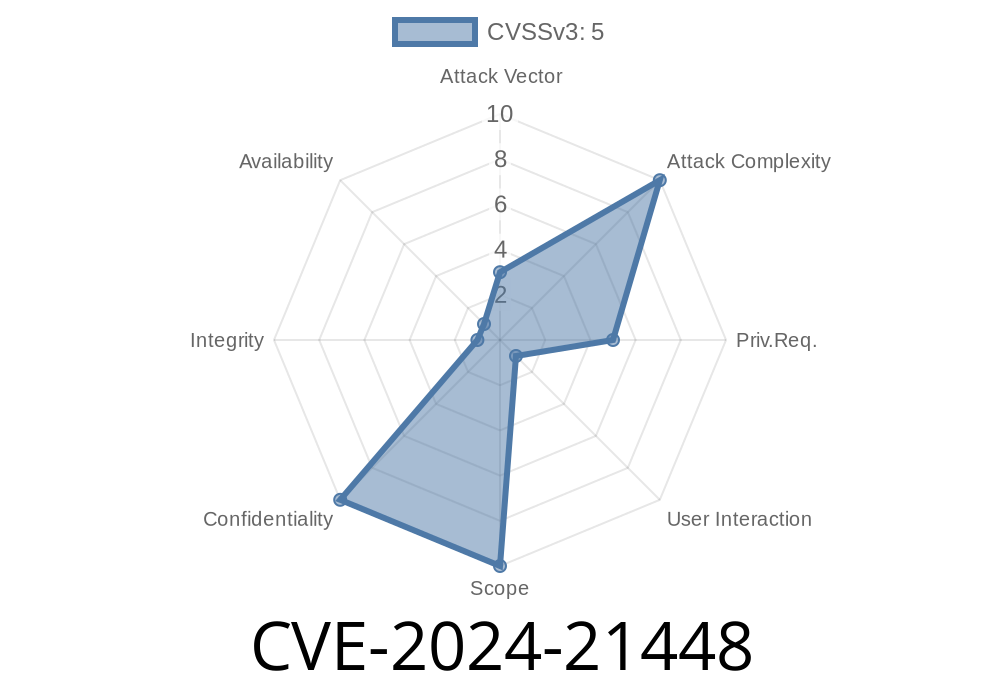In February 2024, Microsoft disclosed a significant security flaw affecting Microsoft Teams for Android, tracked as CVE-2024-21448. If you or your organization uses Teams on Android devices, pay close attention—this vulnerability could have left sensitive data open to prying eyes. In this exclusive post, we’ll break down what went wrong in plain language, give you key technical details, show a code-style example, share exploit insights, and point you to the official references for further reading.
What is CVE-2024-21448?
CVE-2024-21448 is classified as an *information disclosure vulnerability* in Microsoft Teams for Android. Microsoft rated its severity as important. The bug allows attackers to gain unauthorized access to information available in Teams chats on Android phones.
Official Disclosure
- Microsoft Security Response Center: CVE-2024-21448
- February 2024 Microsoft Patch Tuesday Summary
How Does the Vulnerability Work?
Microsoft was tight-lipped about the low-level technical details, but based on security advisories, here’s an easy-to-understand explanation:
- In some versions of Teams for Android, chat content—such as parts of messages, media, or attached files—could be accessed by unauthorized apps *on the same device*.
- The root cause appears to be improper file or data permissions within the Teams app’s local storage. Malicious apps with local access could read sensitive Teams data that should have been isolated.
A Simple Technical Example (Code Snippet)
Imagine that Teams for Android saves chat files or cached data in a way that other apps installed on your phone can read them. This could happen if a file is saved with WORLD_READABLE permissions, like so:
// Hypothetical vulnerable code: Insecure file permissions
File chatCache = new File(getFilesDir(), "teams_chat_cache.txt");
FileOutputStream fos = openFileOutput(chatCache.getName(), MODE_WORLD_READABLE); // BAD! Deprecated and unsafe
fos.write(chatData.getBytes());
fos.close();
Why is this bad?
Android deprecated MODE_WORLD_READABLE years ago because any app on your phone could read the file—opening the door for credential theft, chat leaks, or even internal business data exposure.
A malicious app could then harvest this data
// Malicious code: Stealing Teams chat info
File victimFile = new File("/data/data/com.microsoft.teams/files/teams_chat_cache.txt");
BufferedReader buf = new BufferedReader(new FileReader(victimFile));
String line;
while ((line = buf.readLine()) != null) {
Log.d("StolenTeamsData", line); // Now attacker has chat messages!
}
buf.close();
*Note:* This code is conceptual for illustration. Modern Android may block direct access, but buggy permissions or exploits (like CVE-2024-21448) can bypass these restrictions.
Evil App Installation: Victim installs a rogue app from a shady store or phishing link.
2. Data Scan: The malicious app scans local storage locations for Teams app data (chat logs, attachments).
3. Unauthorized Access: If Teams stored files with insecure permissions, the evil app copies them out.
Microsoft released a patch in February 2024. It’s critical to
- Update Microsoft Teams for Android to the latest version (check Play Store or your company’s device management system).
References and Further Reading
- Microsoft Teams for Android - Google Play
- MSRC Download Center: Security Updates Guide
- NIST National Vulnerability Database: CVE-2024-21448
Final Thoughts
CVE-2024-21448 is a reminder that even trusted business apps like Microsoft Teams need strict attention to data security, especially on mobile devices where cross-app boundaries can blur. Always keep your apps updated, enforce device security, and think twice before installing third-party software.
*If you handle sensitive business information on your phone, this patch should *not* be ignored!*
For security teams:
Review your device inventory for outdated Teams installations, audit app permissions, and consider additional endpoint protection for all managed Android devices.
Timeline
Published on: 03/12/2024 17:15:54 UTC
Last modified on: 03/12/2024 17:46:17 UTC
